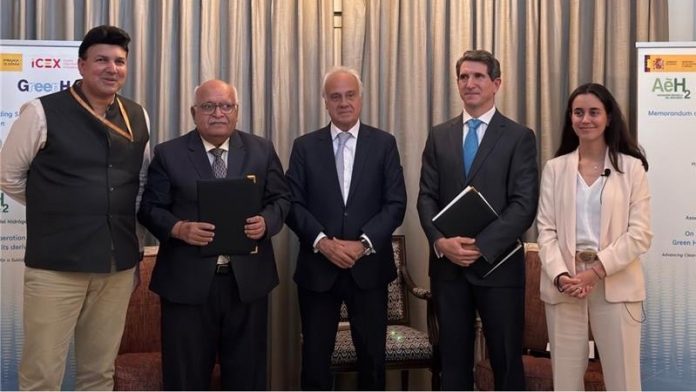In a major stride toward clean energy collaboration, the Hydrogen Association of India (HAI) has signed a Memorandum of Understanding (MoU) with its Spanish counterpart, the Spanish Hydrogen Association (AeH2), on 20 June 2025. The agreement marks a significant international partnership aimed at accelerating the growth of the green hydrogen sector, with a clear focus on research and development (R&D), electrolyzer manufacturing, and workforce skilling.
This partnership comes at a time when both India and Spain are intensifying efforts to decarbonize their economies and meet long-term climate commitments. For India, green hydrogen has emerged as a key pillar in its strategy to achieve net-zero emissions by 2070 and build a robust, self-reliant clean energy ecosystem. The collaboration with AeH2 will provide India with access to Spain’s advanced hydrogen technologies, technical know-how, and policy frameworks, particularly in the area of electrolyzer innovation—a crucial component in green hydrogen production.
The MoU outlines plans to undertake joint research projects, co-develop pilot manufacturing facilities for electrolyzers, and organize training programs for scientists, engineers, and technical personnel. This focus on workforce development is especially vital, as India prepares to scale up its green hydrogen infrastructure under the National Green Hydrogen Mission, which aims to produce 5 million tonnes of green hydrogen annually by 2030.
Representatives from both associations emphasized the importance of international collaboration in developing efficient, affordable, and scalable hydrogen solutions. By combining India’s industrial capacity and talent pool with Spain’s technological expertise, the two nations hope to make green hydrogen commercially viable and globally competitive.
This MoU also reinforces India’s positioning as a future global hub for green hydrogen production and export. The agreement complements India’s ongoing bilateral dialogues with other hydrogen-advanced nations such as Germany, Japan, and Australia, adding momentum to a broader global hydrogen alliance.
In conclusion, the HAI–AeH2 partnership is not just a bilateral agreement—it is a shared commitment to cleaner energy, industrial innovation, and climate resilience. As the world looks to alternative fuels, this collaboration paves the way for meaningful, scalable progress in the global hydrogen economy.



















